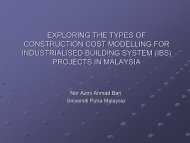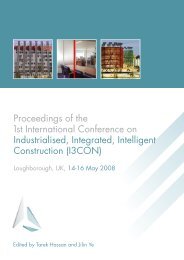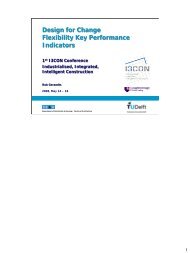Industrialised, Integrated, Intelligent sustainable Construction - I3con
Industrialised, Integrated, Intelligent sustainable Construction - I3con
Industrialised, Integrated, Intelligent sustainable Construction - I3con
Create successful ePaper yourself
Turn your PDF publications into a flip-book with our unique Google optimized e-Paper software.
SUSTAINABLE CONSTRUCTION HANDBOOK 2<br />
Logistics plays a vital role in supporting assembly works on a construction site by co-ordinating and<br />
controlling the complex interaction between constantly changing work areas, a large and varied<br />
workforce, a vast number of vehicles, plant and equipment and a huge quantity of diverse materials.<br />
In addition, correctly delivered construction logistics enables a project team to meet its social<br />
obligations external to the site boundary, such as ensuring public safety, maintaining the operation of<br />
local transport systems, meeting the needs of neighbouring businesses and minimising disruption to<br />
local residents. It achieves this by integrating a construction site into its immediate environment in a<br />
manner that is sympathetic to life outside that of the project team.<br />
Furthermore, logistics plays a crucial role in reducing the environmental impact of the construction<br />
project process by helping to minimise non-renewable resource consumption, the generation of<br />
pollutants, carbon dioxide emissions, noise pollution, road congestion, construction waste production<br />
and visual intrusion. It achieves this by helping to ensure that the supply of materials to site is<br />
controlled by actual construction progress, appropriate material handling equipment is employed and<br />
that the transport of materials, plant and equipment is efficient and effective.<br />
Consequently, logistics has evolved from an operational activity into a strategic necessity for<br />
construction project teams.<br />
168<br />
Demands being placed on construction project teams<br />
The creation of the built environment presents immense technical, organisational and behavioural<br />
challenges to project teams.<br />
These teams need to safely deliver projects on time and within budget to the required standard, whilst<br />
often maintaining a client’s primary operational function, such as the provision of education,<br />
healthcare or transport, the execution of financial transactions, or the manufacture of goods.<br />
These teams are increasingly required to deliver shorter construction programmes, so that clients can<br />
start using their new or refurbished facilities at the earliest opportunity. These same clients are often<br />
applying economic pressure to their construction teams by demanding cost reductions.<br />
<strong>Construction</strong> project teams also need to maintain a view that extends beyond the site boundary and<br />
ensure that social and environmental impact demands are met. Thereby ensuring that the creation of<br />
the built environment meets the needs of the present population, without compromising the ability of<br />
future generations to meet their own needs.<br />
A correctly delivered logistics strategy, either in a project-specific context, an estate-wide context or<br />
across multiple projects can help project teams successfully meet these demands.<br />
Shortcomings in how construction project teams execute logistics<br />
Extensive research undertaken by BSRIA has shown that many construction project teams fail to<br />
manage logistics effectively. This creates working environments in which production rates are highly<br />
variable, worker health and safety is compromised, consistent build quality is difficult to maintain and<br />
the generation of material waste is higher than it should be. Typical characteristics found in these<br />
production environments are illustrated below.






